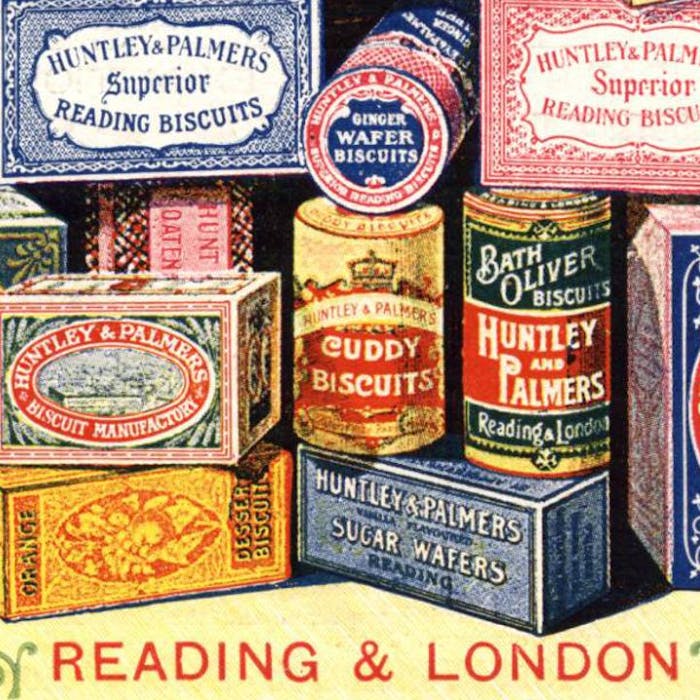
Huntley & Palmers - Reading's famous biscuit makers
Huntley & Palmers was a leading British firm of biscuit makers, originally based in Reading. The company created one of the world's first global brands and ran what was once the world’s largest biscuit factory.
They were especially well-known for their decorative and novelty biscuit tins, like the ones above.
Huntley & Palmers was founded in 1822 and, during the next 150 years, came to be “The Most Famous Biscuit Company in the World”, according to their own publicity.
As global trade and travel expanded during the industrial revolution, and Britain's establishment of the largest Empire the world had ever known, so did this famous company grow, exporting much-loved British and cake varieties to expats around the world, until it became world-renowned for being “Number One in Biscuits and Second-to-None in Cakes.”
Like many of Britain’s longest-established food companies, it was started by a Quaker, the religious sect whose members were forbidden by their law from entering the established professions.
Joseph Huntley, supported by his son Thomas, opened a shop in Reading, from where he started selling biscuits and confectionery. After 19 successful years he was joined by his cousin George Palmer, and together they created a business which, at its peak, was trading in 137 countries.
Huntley & Palmers success was not only based on producing unique, high-quality products. The brand’s packaging, especially with its tins, and its advertising also achieved a great following, and the company won many gold awards at trade fairs in the decades before and after 1900.
At its height, the company employed over 5,000 people, and in 1900 were the world's largest biscuit firm, with its own railway system connecting to the Great Western Railway. By 1903, the firm was producing 400 different varieties, and mass production enabled them to price their products keenly. One source of flour was Hambleden Mill, a few miles down the Thames. Every week a barge, Maid of the Mill brought flour upriver from the mill.
The Palmers were notable local figures in Reading who generously gave money and land to the town, including Palmer Park.
Manufacturing in Reading ceased in 1976 when production by the successor owners was moved to Liverpool. The brand continued to be used in various incarnations until the 1990s. In 1970, following the merger of the Scottish biscuit companies - Crawford's, McVities and McFarlane Lang - and in order to respond to market competition, the three main English biscuit manufacturers, Huntley & Palmers, Peek Frean and Jacobs amalgamated together as Associated Biscuits.
Manufacturing in Reading ceased in 1976. In 1982 Nabisco acquired Associated Biscuits. Production continued at Huyton until 1983. After the closure of the Peek Frean factory at Bermondsey in 1989, Nabisco sold the Associated Biscuit brands (Huntley and Palmers, Peek Frean, and Jacobs) to Danone.
In 2006, Huntley & Palmers resumed operations from Sudbury in Suffolk. The management team included a former marketing director of Jacobs Bakery, which once owned the company, and a founder of Vibrant, a successful packaging design company. They targeted the specialty and fine food sector. Since 2008, Huntley and Palmers have been owned by the Freeman family, with three generations in the biscuit business. Their aim is to bring the name of Huntley and Palmers back into the mainstream, with several products ranges focusing on different market sectors, and including, once again, biscuit tins.
Huntley & Palmers biscuits were part of the food supply for the ill-fated Antarctic expedition with Captain Scott at the beginning of the 20th century. In 2017, conservators found a 106-year-old fruitcake from the company in an Antarctic cache. When Sir Francis Younghusband was the first European to reach the Forbidden Kingdom of Tibet, he was astonished to find a selection of Huntley & Palmers biscuits offered to him as a welcome gift.
Further reading
Links to external websites are not maintained by Bite Sized Britain. They are provided to give users access to additional information. Bite Sized Britain is not responsible for the content of these external websites.
